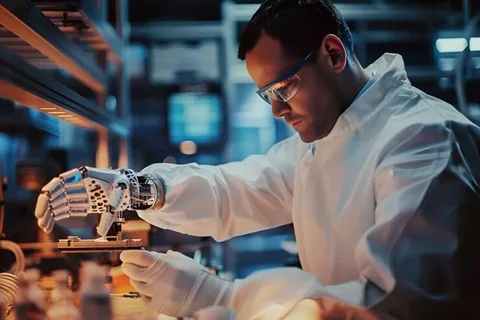Generative AI Revolutionizing Creativity and Productivity
Generative AI is transforming industries by enabling machines to create original content, including text, images, and music, based on simple prompts. This technology is enhancing productivity in fields such as content creation, design, and entertainment. By 2025, generative AI is expected to become a cornerstone of creative processes, allowing for rapid prototyping and personalized content generation. Its applications are vast, ranging from automating design tasks to generating realistic simulations for training and development.
Quantum Computing Unlocking Complex Problem Solving
Quantum computing leverages the principles of quantum mechanics to process information in ways that classical computers cannot. This capability allows for the solving of complex problems in fields such as cryptography, material science, and drug discovery. With advancements in quantum hardware and algorithms, by 2025, quantum computing is poised to tackle challenges that were previously insurmountable, opening new frontiers in scientific research and technological innovation.
6G Networks The Next Frontier in Connectivity

While 5G networks are still being deployed globally, research into 6G technology is already underway. 6G promises to deliver speeds up to 100 times faster than 5G, with ultra-low latency and enhanced reliability. This advancement will enable real-time holographic communication, seamless integration of AI in everyday devices, and the proliferation of smart cities. By 2025, initial 6G trials are expected to commence, setting the stage for a new era of connectivity.
Agentic AI Autonomous Decision-Making Systems
Agentic AI refers to systems that can make autonomous decisions based on data analysis and predefined objectives. Unlike traditional AI, which requires human intervention, agentic AI operates independently to optimize processes in real-time. In sectors like finance, healthcare, and logistics, agentic AI is being integrated to enhance efficiency and reduce human error. By 2025, agentic AI is expected to be a standard component in enterprise automation strategies.
Edge Computing Decentralizing Data Processing
Edge computing involves processing data closer to its source, reducing latency and bandwidth use compared to traditional cloud computing models. This approach is particularly beneficial for applications requiring real-time data analysis, such as autonomous vehicles, industrial automation, and remote healthcare monitoring. By 2025, edge computing is anticipated to become integral to the infrastructure of smart cities and IoT ecosystems, enabling faster and more efficient data processing.
Biometric Innovations in Security Enhancing Authentication Methods
Biometric technologies, including facial recognition, fingerprint scanning, and voice identification, are revolutionizing security systems by providing more secure and convenient authentication methods. These technologies are being integrated into smartphones, banking systems, and access control systems to enhance user experience and security. By 2025, biometric authentication is expected to replace traditional passwords in many applications, offering a more seamless and secure user experience.
Sustainable Technologies Driving Environmental Responsibility
As concerns over climate change intensify, sustainable technologies are gaining prominence. Innovations in renewable energy, energy-efficient devices, and waste management are helping to reduce environmental impact. By 2025, the adoption of green technologies is expected to accelerate, driven by regulatory pressures and consumer demand for eco-friendly products and services. These technologies are not only contributing to environmental conservation but also creating new economic opportunities in the green tech sector.
Neurological Enhancement
Neurological enhancement technologies, such as brain-machine interfaces (BMIs), are enabling direct communication between the human brain and external devices. These advancements have the potential to assist individuals with disabilities, enhance cognitive abilities, and create new forms of human-computer interaction. By 2025, neurological enhancement is expected to see significant advancements, with applications in healthcare, education, and entertainment.
Blockchain and Decentralized Finance (DeFi)
Blockchain technology provides a secure and transparent way to record transactions, which is revolutionizing industries beyond cryptocurrency. In finance, blockchain is enabling decentralized finance (DeFi) platforms that offer financial services without traditional intermediaries. By 2025, blockchain and DeFi are expected to disrupt traditional financial systems, offering more inclusive and efficient financial services to a global audience.
Augmented Reality (AR) and Virtual Reality (VR)
AR and VR technologies are transforming industries by providing immersive experiences that enhance learning, training, and entertainment. In education, AR and VR are being used to create interactive learning environments, while in healthcare, they are utilized for surgical training and patient rehabilitation. By 2025, AR and VR are expected to become mainstream tools in various sectors, offering new ways to engage and interact with digital content.
Conclusion
The technological landscape in 2025 is marked by rapid advancements that are poised to reshape industries and everyday life. From the rise of generative and agentic AI to the advent of 6G networks and sustainable technologies, these innovations offer exciting possibilities for the future. As we move forward, embracing these emerging technologies will be crucial for staying competitive and addressing global challenges. By understanding and integrating these technologies, individuals and organizations can position themselves at the forefront of the next technological revolution.

Leave a Reply